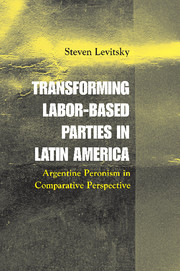Book contents
- Frontmatter
- Contents
- Figure and Tables
- Acknowledgments
- 1 Labor-Based Party Adaptation in the Neoliberal Era: Rethinking the Role of Party Organization
- 2 Origins and Evolution of a Mass Populist Party
- 3 An “Organized Disorganization”: The Peronist Party Structure in the 1990s
- 4 Populism in Crisis: Environmental Change and Party Failure, 1983–1985
- 5 From Labor Politics to Machine Politics: The Transformation of the Peronist Party–Union Linkage
- 6 Menemism and Neoliberalism: Programmatic Adaptation in the 1990s
- 7 A View from Below: Party Activists and the Transformation of Base-Level Peronism
- 8 The Paradox of Menemism: Party Adaptation and Regime Stability in the 1990s
- 9 Crisis, Party Adaptation, and Democracy: Argentina in Comparative Perspective
- References
- Index
2 - Origins and Evolution of a Mass Populist Party
Published online by Cambridge University Press: 22 December 2009
- Frontmatter
- Contents
- Figure and Tables
- Acknowledgments
- 1 Labor-Based Party Adaptation in the Neoliberal Era: Rethinking the Role of Party Organization
- 2 Origins and Evolution of a Mass Populist Party
- 3 An “Organized Disorganization”: The Peronist Party Structure in the 1990s
- 4 Populism in Crisis: Environmental Change and Party Failure, 1983–1985
- 5 From Labor Politics to Machine Politics: The Transformation of the Peronist Party–Union Linkage
- 6 Menemism and Neoliberalism: Programmatic Adaptation in the 1990s
- 7 A View from Below: Party Activists and the Transformation of Base-Level Peronism
- 8 The Paradox of Menemism: Party Adaptation and Regime Stability in the 1990s
- 9 Crisis, Party Adaptation, and Democracy: Argentina in Comparative Perspective
- References
- Index
Summary
Those who get stuck in one system and become excessively stable lose perfectibility. Perfectibility comes with evolution. … One cannot go changing organizations every day, but one also cannot constantly stay with the same organization. One has to make it evolve in line with the times and the situation.
– Juan PerónParty organizations, particularly those of mass parties, are both shaped and constrained by the past. Large-scale organizations rarely re-create themselves from scratch, even when it may be more efficient for them to do so. Wholesale organizational change entails substantial costs, both in terms of overcoming vested interests and established routines and in terms of coordinating, overseeing, and enforcing new sets of rules, procedures, roles, and routines. Because these costs are frequently higher than the benefits associated with the new, more efficient structure, change within mass party organizations tends to be slow, arduous, and incremental. For this reason, party development has been characterized as a path-dependent process, in the sense that contemporary organizations tend to reflect the choices and political conflicts of earlier periods (Panebianco 1988). According to Panebianco, a party's
organizational characteristics depend more upon its history, i.e. on how the organization originated and how it consolidated, than upon any other factor. The characteristics of a party's origin are in fact capable of exerting a weight on its organizational structure even decades later. Every organization bears the mark of its formation, of the crucial political-administrative decisions made by its founders, the decision which “molded” the organization (1988: 50).
- Type
- Chapter
- Information
- Transforming Labor-Based Parties in Latin AmericaArgentine Peronism in Comparative Perspective, pp. 35 - 57Publisher: Cambridge University PressPrint publication year: 2003



